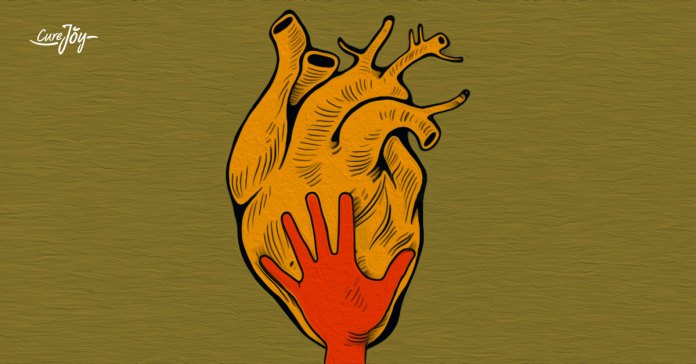Heart disease is one of the most common disorders in America. Hence, a big chunk of the scientific community is dedicated to studying the risk factors of, and treatment options for the disease.
A recent study looked into the early signs of heart disease. It concluded that young men can predict the incidence of heart disease based on the length of their fingers.
Finger Length And Heart Disease
Generally, the details of our hands are of interest only to palmists and hand readers. But, a study conducted by the University of Liverpool School of Biological Sciences states that the difference between the length of your ring finger and index finger points to the risk of heart disease in men.
This study looked at 151 male heart attack victims. They discovered that the age range for heart attacks in men with longer index fingers was between 35 and 80. Inversely, in men with longer ring fingers, the age range was between 58 and 80. Although this ratio doesn’t necessarily guarantee the incidence of heart disease, experts say that it does indicate its possibility.
Longer ring fingers are believed to be found in men who have high levels of the sex hormone testosterone. Testosterone is known to protect against heart disease in men. Hence, younger heart attack victims tend to have lower levels of testosterone and shorter ring fingers.
Researchers of this study state that this important finding could help nip heart disease in the bud by influencing men to change their lifestyle habits early on. And, this is significantly important considering the fact that more than half of the deaths in America caused due to heart disease are in men.1 However, this isn’t the first time that fingers have been studied in relation to health conditions. Previous research has linked finger-length ratio with fertility and breast cancer risk in women.
One possible reason for the focus on fingers could be the fact that body size and composition changes constantly, but finger length does not. Additionally, genes that are indirectly responsible for the production of testosterone also control the development of fingers.2 However, you don’t have to rely on just your fingers to recognize the early signs of heart disease.
Other Signs Of Heart Disease
Heart disease is the leading cause of death in America.3 Hence, it’s important to recognize the early signs of the disease.
- Rheumatoid arthritis: A study of 8,000 people in Finland, published in the Annals of Rheumatic Diseases, states that in men, having rheumatoid arthritis in even one finger joint increases the risk of heart disease by 42%.4
- Endothelial function: There’s evidence to suggest that irregular endothelial function increases the risk of heart disorders. So, do talk to a professional about getting an endothelial function test.5
- Lifestyle factors: People who smoke, have a poor diet, drink excessive alcohol, and are physically inactive are at a high risk of developing heart disease.
Besides the above, diabetes, high blood pressure, high cholesterol, and obesity are high-risk factors for heart disease. It’s also important to recognize the signs of a heart attack, which include pain in the chest, jaw, neck, and back along with weakness, lightheadedness, nausea, and shortness of breath.6 7 In order to prevent the incidence of heart disease, it’s important to make a few changes in your lifestyle.
Tips To Prevent Heart Disease
Prevention techniques for heart disease include making lifestyle changes and treating other health conditions. Here are a few things you can do to reduce the risk of heart disease.8
- Quit smoking
- Eat foods high in dietary fiber and healthy fats
- Reduce intake of salt, sugar, and processed food.
- Limit alcohol consumption
- Maintain a healthy weight
- Work out regularly
- Manage high blood pressure and diabetes
- Manage stress
Additionally, it’s important to manage your cholesterol and talk to a professional regarding any prevention techniques that you could employ if your family has a history of cholesterol. Get your blood pressure checked at least once every 2 years if you have never had high blood pressure or other risk factors for heart disease.9 10
The key to beating heart disease is to start young. Be sure to discuss any queries that you might have with a professional so you can do your best to stay healthy.
References





